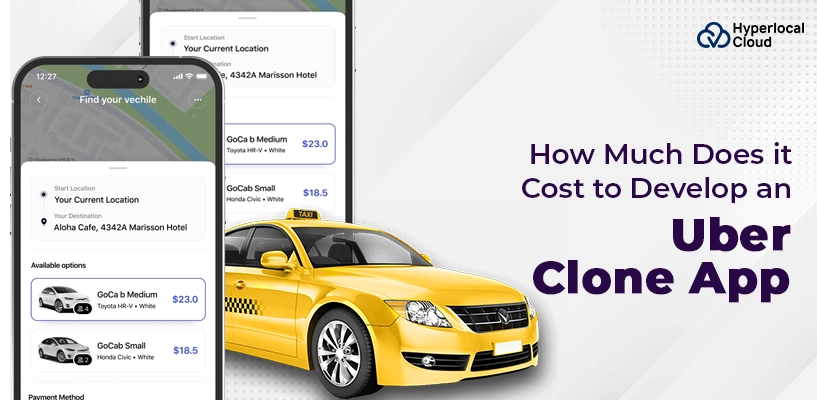Uber Clone App Development Cost

Are you curious about the cost of Uber clone app development? Look no further! This comprehensive guide will unveil the intricacies and expenses of creating a ride-hailing app similar to Uber. With the increasing popularity of on-demand transportation services, entrepreneurs and businesses are eager to invest in developing their own Uber-like applications. However, before starting this journey, understanding the cost factors and budget constraints is crucial.
From app development and server hosting to payment integration and user interface design, we will delve into every aspect of building an Uber clone app, and provide a clear understanding of the expenses involved. Whether you are a startup looking to disrupt the ride-hailing industry, or an established business seeking to expand your services, this guide will equip you with the knowledge and insights to make informed decisions and create a successful Uber clone app.
Are you an automobile owner and want to modernize your ride-hailing business? Hyperlocal Cloud can help you get a top-notch Uber-like clone app that will elevate your automobile business to the next level.
So, let’s dive in and uncover the secrets to building a cost-effective and feature-rich ride-hailing app!
Stats Predicting The Future Of Ride-Sharing Businesses

Image Source: Statista
- The Economic growth in the ride-hailing business is expected to reach $330.80 billion by the end of 2023.
- Ride-hailing business is anticipated to show an annual CAGR rate of 3.46%, resulting in a market volume of $379.00 billion by the end of 2027.
- User ingression in the ride-sharing app is 17.4% in 2023, expected to rise to 18.3% in 2027.
Understanding The Components Of An Uber Clone App
Building an Uber clone app requires a deep understanding of its various components. These components include the user interface, driver interface, admin panel, and server infrastructure.
- The user interface is the face of the app, allowing passengers to request rides, track live drivers, and make payments.
- The driver interface is designed for drivers to accept or reject ride requests, navigate to the passenger’s location, and complete the ride.
- The admin panel is essential for managing users, drivers, payments, and resolving disputes.
- The server infrastructure handles the app’s operations, including data storage, real-time updates, and communication between users and drivers.
Developing these components requires a skilled team of designers, developers, and quality assurance professionals. The user interface must be intuitive, visually appealing, and responsive across different devices.
Factors That Influence The Cost Of Building An Uber Clone App
Several factors influence the cost of Uber clone app development. These factors include the complexity of features, the number of platforms supported, the technology stack used, the development team’s location, and the time required for development.
Also Read: – Must Have Features In Uber Clone App
Cost In Different Aspects
Uber clone app development with essential features like ride booking, driver tracking, and payment integration will cost less compared to an app with additional features like surge pricing, in-app messaging, and ride-sharing. Supporting multiple platforms like iOS and Android will increase the development cost as it requires separate codebases and testing efforts.
Native App Development
The technology stack used for app development also impacts the cost. Choosing native app development over cross-platform development can be costlier but provides a better user experience. The development team’s location is another significant factor, as rates vary across regions.
Development Team
Hiring a development team from countries with lower labor costs can help reduce expenses. Additionally, the time required for development affects the overall cost. Complex apps with advanced features and extensive testing may take longer to develop, resulting in higher costs.
Company’s Region
Cost also depends on the region of the company and location. For instance, app development costs are higher in Japan than in the USA. Economic status of the company’s country is also considerable for development costs.
Researching and Choosing The Right Team for Your Uber Clone App Development
Researching and choosing the right development team is crucial for Uber clone app development within your budget.
Project Requirement
Start by identifying your project requirements and determining the skill set required for the development. Look for development teams with experience in building similar on-demand apps and check their portfolio to assess the quality of their work. Read client testimonials and reviews to gain insights into their reliability and professionalism.
Team’s Expertise
Consider the development team’s expertise in the required technologies and ability to deliver projects on time. Communication is key, so ensure that the development team has efficient channels for collaboration and regular updates.
Compare Pricing
Compare the pricing models of different development teams and choose the one that balances cost and quality. Remember to sign a comprehensive agreement outlining the project scope, deliverables, timelines, and payment terms to avoid misunderstandings or disputes.
How Much Does Uber Clone App Development Cost?
Uber clone app development can be a complex task. However, you can get a rough cost estimate by breaking down the development process into various stages and considering the factors mentioned earlier. Let’s understand some factors affecting the Uber clone app development:
Development Element
The development process typically involves project planning, UI/UX design, app development, quality assurance, and deployment.
Planning
Project planning involves defining the project’s scope, features, and timeline. Depending on the complexity of your app, this stage may require several weeks or months of effort. UI/UX design focuses on creating intuitive and visually appealing interfaces. The cost depends on the number of screens, the level of customization required, and the complexity of design elements.
App Development
App development is the most time-consuming and costly stage. The cost depends on the number of features, platforms supported, and hourly rates of the development team. Quality assurance ensures the app functions as intended and is free from bugs and glitches. Deployment involves releasing the app to app stores and configuring server infrastructure. These stages also incur costs like app store fees and server hosting charges.
On average, your Uber Clone app development can cost around $60,000–$120,000, and this price tends to rise higher or go lower depending on the features and functionalities.
Ways To Reduce The Cost Of Building An Uber Clone App
Building an Uber clone app can be expensive, but several ways exist to reduce costs without compromising quality. Consider the following strategies:
Minimum Viable Product (MVP)
Start with a minimum set of essential features for launching your app. This allows you to test the market and gather user feedback before investing in additional features. This allows for continuous improvement based on user feedback and reduces the risk of investing in unnecessary features.
Cross-Platform Development
Instead of developing separate apps for iOS and Android, consider cross-platform development frameworks like React Native or Flutter. This reduces development time and costs.
Use Open-Source Technologies
Leverage open-source technologies and libraries to reduce development time and costs. This avoids reinventing the wheel and allows developers to focus on customizing the app to your specific requirements.
Some Apps That Resemble an Uber Clone App
Here we’ve mentioned some companies with successful case studies of the Uber clone app:
Lyft
Lyft is a popular ride-hailing app similar to Uber. It was developed at an estimated cost of $60,000 to $70,000. The development cost includes UI/UX, backend infrastructure, and deployment.
Grab
Grab is a ride-hailing app based in Southeast Asia. It raised $750 million in its initial funding round. The app development cost is estimated at around $2 million due to its exclusive features, regional scalability, and integration of various third-party services.
Ola
Ola is one of the leading ride-hailing apps in India, like Uber. It raised over $3 billion in funding. The app’s development cost is estimated to be around $5 million, considering its complex features, regional customization options, and large user base.
These resembling Uber clone app shows that there is plenty of opportunity for growth if you are planning to invest in Uber clone app development.
How Can Hyperlocal Cloud Help In Uber Clone App Development?
Here are a few reasons why you should choose us for your Uber clone app development:
Decade Long Experience
Hyperlocal Cloud has experience in developing such platforms for 4+ years. We have complete expertise in every aspect of your Uber clone app development.
On-Time Delivery
We ensure the accomplishment of the project before the deadline and deliver it to our client on time.
Experience Workforce
Our team of developers is well-qualified, and they help you provide an Uber clone app development with cutting-edge technology.
Far-Reaching Service
Time-zone is not a boundary for us. We allow our clients to reach us anytime they want.
250+ Global Clients
The numbers speak louder of our success. Hyperlocal Cloud has served more than a thousand clients worldwide and helped them achieve their desired needs.
Conclusion
Uber clone app development involves significant costs, including development, maintenance, marketing, and ongoing support. However, the potential benefits and returns on investment can make it worth the cost. The ride-hailing industry is growing rapidly; there is still room for new players and innovative solutions. By providing a convenient and reliable transportation service, you can attract a large user base and generate revenue through commission or subscription models.





